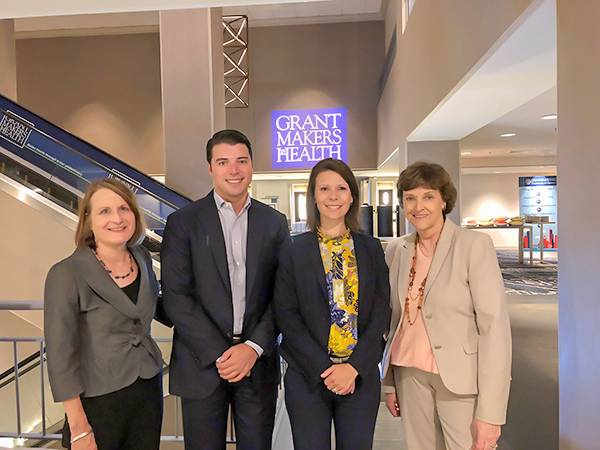You are here
Philanthropies Can Accelerate Health and Help Control Health Costs in U.S. States
Last week, the CDC Foundation joined philanthropies from across the country in Chicago, IL, at the 2018 Grantmakers In Health (GIH) Annual Conference on Health Philanthropy. In coordination with GIH, CDC Foundation President and CEO Dr. Judy Monroe moderated a session to emphasize the value of state-level partnerships between public health and philanthropy in accelerating implementation of the U.S. Centers for Disease Control and Prevention’s (CDC) 6|18 Initiative. Support for the program is also provided in part by the Robert Wood Johnson Foundation.
In response to the rapidly changing healthcare sector, CDC’s 6|18 Initiative addresses six high-burden and high-cost health conditions—tobacco use, high blood pressure, healthcare-associated infections, asthma, unintended pregnancies and diabetes—with an initial 18 evidence-based interventions aimed at improving health and controlling healthcare costs by bringing together healthcare purchasers, payers and providers with health departments and CDC.
“Since the CDC Foundation sits at the intersection between government and philanthropy, we have tremendous experience building public-private partnerships at the global and national level to benefit public health,” said Monroe. “CDC’s 6|18 Initiative offers us the opportunity to apply our partnership-building model at the state level.”
Jocelyn Wheaton, who serves in CDC’s Office of the Associate Director for Policy as deputy director in the Office of Health Systems Collaboration, joined Monroe in the session’s panel discussion and provided an overview of progress made to date in implementing the 6|18 Initiative’s clinical and community-based interventions in 15 U.S. states plus Washington, D.C., and Los Angeles County, CA. In October 2018, CDC plans to expand support to additional states.
Panelist Dr. Nicole Alexander-Scott, director of the Rhode Island Department of Public Health and president-elect of the Association of State and Territorial Health Officials (ASTHO), shared examples of how partnerships with the state Medicaid agency and CDC’s 6|18 Initiative have presented opportunities for philanthropy to amplify the impact of innovative state-level collaborations. For example, Rhode Island implemented innovative place-based strategies to promote healthy communities, which are built upon collaborations throughout the community.
“In Rhode Island, the opportunity to partner with philanthropy is endless,” said Alexander-Scott.
Providing the perspective of how philanthropy can align with state government to have greater impact by building on the existing public health infrastructure, Dr. Gary Nelson, president of the Healthcare Georgia Foundation, added, “We want our work to be grounded in science, built on partnerships and focused on results, and truly nothing comes closer to that than CDC’s 6|18 Initiative.”
Nelson described the value in leveraging the evidence-based and cost-saving interventions of CDC’s 6|18 Initiative as vital to philanthropy in partnering with state legislators for policy outcomes as well as with the public health sector to align priorities and maximize effectiveness of their work.
Many thanks to Jocelyn Wheaton, Dr. Nicole Alexander-Scott and Dr. Gary Nelson for joining with the CDC Foundation to highlight both the complex public health challenges faced across the country and the important opportunities presented by CDC’s 6|18 Initiative for public-private partnerships to serve as a catalyst for public health advancement.
For more information about the CDC Foundation’s work with CDC’s 6|18 Initiative, please contact Alison Thompson, CDC Foundation’s associate vice president for advancement, at athompson@cdcfoundation.org. To learn more about CDC’s 6|18 Initiative, visit www.cdc.gov/sixeighteen.

